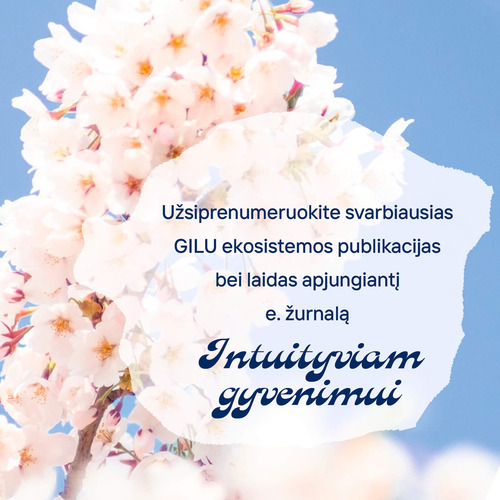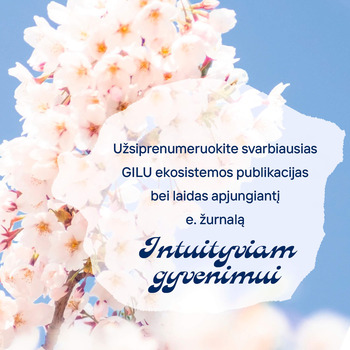Publications
- Home
- Publications
Balčiūnienė: the patriarchal system has reached its end point - we need a new world view
2022 04 09LRT.lt
Rasa Baltė Balčiūnienė, the founder of the HAI Institute, a developer of leadership trainings, a practitioner of ontopsychology, and founder of the HAI Institute, argues that the system of the current world is no longer functioning properly, but the vision of the future is still unclear. Her inspiration for where we can draw ideas and strength for a new phase came from her acquaintance with the Ancient European civilisation studied by archaeomytologist Marija Gimbutiene. "We have in our genetic memory an example of how civilisation can work differently," she says.
- It is often said that the war in Ukraine is yet another mistake by a humanity desperate to transform itself. You say that we are currently experiencing the bankruptcy of a patriarchal society. Could you explain the idea?
- When I was analysing the discoveries of the archaeomycologist Maria Gimbutyene, which are easy for me to understand intuitively, because I hear an ontopsychological worldview in them, I realised that patriarchy began with the conquest of the territories of the matristic Old Civilisation by the Indo-Europeans. Perhaps Mrs Gimbutyen also made me think about when the manifestations of violence in society began. When I use the word 'violence', I do not just mean the most brutal physical manifestation. Before the point of physical violence is reached, there must surely be manifestations of psychological violence.
The beginnings can be found even in the immediate environment, in the family, when, for example, parents see their child as an extension of them, who must conform to their ideas, attend the clubs they want him to attend, and so on. What I want to say is that what is happening at a systemic level are the expressions of the violence that is within us, within our immediate environment. Nothing will change externally as long as a person applies violence to himself and his environment. Only coercion should not be confused with internal discipline. It is a very fine line.
- How then to deal with those manifestations of violence in one's environment? How do we recognise the very beginnings?
- First of all, we need to understand what societal images and stereotypes operate in the human subconscious and define for us what is right and what is wrong, what is a good life and what is a bad life. In other words, trying to understand how you are shaped by your culture and environment. It is also important to grasp what traumas you carry through life. These, by the way, are quite evident in the context of war.
If a person, a society, is programmed to always choose one way and not another, it is worth looking at it critically. In that case, we are cutting out part of the possibilities of life, they do not exist for us. Once we have identified what limits me, then the second step is to go deeper into what my inner self is saying, what my vocation is.
I like the fact that we are now talking more and more about the fact that all change starts with oneself. But then there is the question - which self? Who am I? Neuroscientists talk about the fact that we usually perceive ourselves as images, memories and beliefs about who I am, shaped by the past. But this is again the same social, cultural self.
I want to tell a short metaphorical story that illustrates this well, about a Chinese rose that was born in a cactus family, and the cacti, wanting all the best, taught the Chinese rose to look for the conditions of the cactus. However, a rose cannot bloom without water. In many cases, when we say "I", we identify ourselves with the cactus, even though we are roses. It is very difficult to get away from that. Most mindfulness and spirituality practices teach us how to detach ourselves from this imaginary self, from our illusions, from the desires dictated by our environment. To begin to see our own nature better.
In ancient civilisation there was a cult of the Great Goddess, the creative energy. That creative energy is the Chinese rose. A creative person is able to make decisions based on a simple criterion - whether he will get more or less vitality out of it. Then there is honesty with oneself - I choose what is useful and pleasurable for me in a particular context and what is not.
In a coercive system, this is not valid. Self-benefit, ultimately pleasure, is displaced. In today's context, it is "right" to sacrifice one's own pleasure for the sake of social norms. Or to choose externally imposed pleasures, which often carry the risk of addiction - sugar, alcohol, digital technology, fashion, etc. Forbidden, delayed true pleasure manifests itself in several ways - life is perceived only as a function and therefore does not provide any happiness. At the other extreme, pleasure is achieved through harmful habits, external stimulation. Life must have both aspects - function and pleasure.
Mindfulness teachers talk extensively about what happens when we live our lives solely by rational thought and do not respond to the signals sent by the body - this leads to a breakdown in mental and physical health.
Yes, it is difficult to be in conflict between what I inherently want and what I am capable of, so the psyche puts up a defence mechanism and starts to ignore the body's sensations. This is one of the reasons why many people today do not experience happiness. In earlier times, one had to be functional, because that was just the way the world was, and that guaranteed survival. But now we have all the conditions to live without compulsion.
I will come back to pleasure. In the past, for women, sexual intercourse was a duty, but not a pleasure, as it was in the civilisation of Old Europe. When it was denied, the creative energy that is directly linked to sexuality was also suppressed. The creative energy only bursts forth spontaneously, without compulsion. The fundamental change from the Ancient Civilisation studied by M. Gimbutyene was that women were the creators of history, whereas in patriarchal times they were inactive agents, objects of beauty and service.
The conviction that survival could only be achieved by denying oneself, by not listening to one's own body, was passed on from generation to generation. And so the coercive society continues. However, it now seems to me that this system has reached its end point and needs to change radically: the world needs a new image of the future. We are now at the stage where the old world is no longer working, but there is no new image of the world yet.
The importance of the creative person, who can make his decisions on the basis of a single criterion, has been lost in the culture of violence: does he feel more or less life when he acts?
- New leaders are likely to offer that image of a new world. What do you think we need now?
- Our genetic memory already contains information on how civilisation can work differently (I am thinking again of the Old Civilisation), and we can draw ideas and strength from there.
In times of war, we need a way of doing things and we need leaders - directives that bring everybody together, regardless of individuality. In peacetime, we need leaders who create an environment in which people's abilities flourish. That is when more vitality is created.
For people who are under the influence of a leader, it is not what the leader says that is important, but how his psyche manifests itself, his body language, his energy, his relationship with the environment. That is why we need leaders who are first and foremost strong inside. They are able to define the boundaries within which they can exert their influence and to understand what his actions are doing to nurture himself and the people under his influence. A strong leader sees more deeply the causes and understands his position because he senses an emerging picture of the future.
I have met many strong people in business who "lose themselves" in their families. It is as if they do not find their position, their role, their limits. Without a position in the family, they run off to work, which in the long run can become like a drug.
A strong person is able to perceive his sphere of influence, his role and his position, even under conditions of uncertainty, and to formulate his goals by seeing the landmarks of his life.
- This seems a very difficult task. How can one be so stable, so purposeful, under conditions of uncertainty?
- Life is always uncertain. Our reality is a projection of our emotional reactions. As the world becomes more and more complex, it becomes more and more difficult for us to define reality. In the past, you could successfully act according to your learned patterns, repeat them many times, transfer them from one context to another, but nowadays things are changing too fast, so contextual thinking and the ability to act in a particular context are more necessary than ever.
We still see a lot of things in terms of a dualistic conception of the world - good-evil, female-male, black-white - and in the same civilisation that Gimbutyene discovered, that conception did not exist. There, there was a creative energy at work, which changed its forms depending on the context. It is a completely different way of thinking.
We in Lithuania, in all of Eastern Europe, have in our roots an example of Old European civilisation, which can be revived in certain aspects in modern society. Just to remind you of how much a creative person can achieve if their potential is unlocked.
It is also very important to see the future. Today's man should ask himself whether I want to participate in the bankruptcy of the patriarchal system, or do I want to contribute to the birth of a new civilisation, a humane system? It is only necessary to realise that the results may not be seen for a very long time.
- Could you name leaders who already have that vision of the future and are creating a new quality?
- I think that the most prominent today are those who are working within the normal, patriarchal system, while others are just quietly doing their job.
The war in Ukraine today is awakening the genetic memory of the old European civilisation. Our very strong reaction to what is happening in Ukraine, and the feeling that this is our war, is, in my opinion, manifesting itself through it.
I have faith that Eastern Europe will, after a while, become a centre of spiritual rebirth, a centre of new quality. Ukraine will need to recover for some time, and it will suffer a lot, but the surrounding countries will soon have the energy for a new change. It seems to me that in Lithuania we are about to see very interesting processes. Especially if we turn to true humanism.












